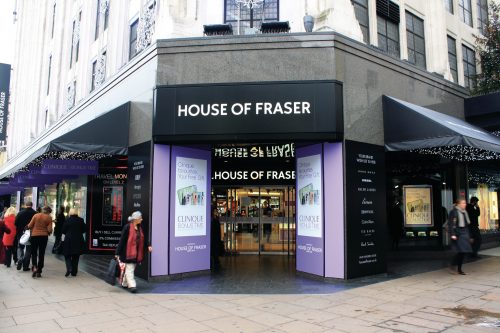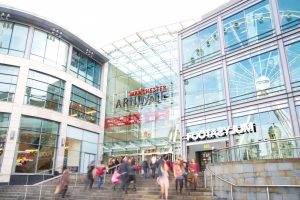Crisis on High Street deepens as retail sector hit by double blow

Department store chain House of Fraser has appointed administrators after talks with potential investors failed to result in a rescue.
In a statement, it said that talks with investors and creditors had “not concluded in a solvent solution”.
House of Fraser employs 17,500 people, including 11,500 concession staff.
The proposed administrators have confirmed that the business will continue trading, including all stores and offices, while they seek to complete a sale. All stores will be open for business as usual today.
Alex Williamson, Chief Executive of House of Fraser, said: “We are hopeful that the current negotiations will shortly be concluded. An acquisition of the 169 year old retail business will see House of Fraser regain stability, certainty and financial strength.
“In the two weeks since the Cenbest and C.Banner transaction ceased, the directors have brought forward a number of potential buyers and the Group’s financial advisors have run a comprehensive M&A process to identify and then develop other third party interest that has culminated in the senior secured creditors leading negotiations with parties at a critical pace.”
“Frank Slevin, Chairman of House of Fraser, commented: “This has been an extraordinarily challenging six months in which the business has delivered so many critical elements of the turnaround plan.
“Despite the very recent termination of the transaction between Cenbest and C.Banner, I am confident House of Fraser is close to securing its future.”
And there was a double blow for high street retailers after Homebase announced it could close up to 80 stores leaving 11 branches in the North West under threat.
Up to 1,000 jobs could be lost if Homebase presses ahead with its plans for a Company Voluntary Agreement. Homebase has already closed 17 unprofitable stores as it struggles to stay afloat.
Branches in Bredbury, Carlisle, Clitheroe, Formby, Morecambe, Kendal, Preston, Sandbach, Altrincham, Horwich and Macclesfield are potentially at risk.
Earlier this month, a potential investor in House of Fraser cancelled its fundraising plans to become a major shareholder.
C.banner, a retailer of footwear brands in China, was planning to invest £70m into the firm but cancelled its planned share placing due to falls in its share price. It had agreed in May to buy a 51% stake in House of Fraser.
House of Fraser said administrators EY had confirmed that the business would continue trading, including all stores and offices, while they attempted to complete a sale.
All 59 shops are set to open as usual today, including 31 that have already been earmarked for closure as part of a restructuring agreement.
The firm said: “Significant progress has been made towards completing a sale of the group’s business and assets.
“The proposed administrators are expected to continue to progress those discussions with a view to concluding a transaction shortly after their appointment.”
House of Fraser is one of many UK retailers this year to have been hit by increasing online competition, higher consumer spending, rising labour costs and higher business property taxes; leading to the administration of several high street names including Poundworld, Toys R Us, Maplin.
Homebase would be following in the footsteps of House of Fraser, Mothercare and Carpetright who have all been forced to take desperate measures in the fight to survive.
Dave Gill of shopworkers’ trade union Usdaw said: “Staff in Homebase stores were extremely worried for the future after the announcement of head office job losses; and mounting speculation about store closures is clearly very concerning.
“I am in touch with the company and providing our members with the representation, support and advice they require at this difficult time.
“Clearly there is a huge task ahead to turn the company around, after it was sold for just one pound following the disastrous ownership by Wesfarmers.
“It is crucial that the company listens to the staff and invests in their experience and expertise to make a success of the business.”
Homebase has endured a turbulent couple of years and it was bought by restructuring experts Hilco in May.
The CVA is expected to be handled by Alvarez & Marsal, a specialist adviser on corporate insolvencies that advised Toys R Us before its collapse.
Infamously Homebase was bought by Hilco, owner of HMV, for £1 after its Australian owner Wesfarmers walked away from the business.
The acquisition is widely regarded as one of the most unsuccessful in UK retail history.
Wesfarmers, which bought Homebase for £340m two years ago, ditched the chain which had over 250 stores and 11,000 staff after its plans fell apart.
Melanie Leech, the chief executive of the British Property Federation, said: “CVAs should not be entered into lightly as they impact jobs, local communities and property owners and the pensioners’ savings that they invest.
“We advise any insolvency practitioner, representing a business seeking to enter into a CVA, to engage in confidence with the British Property Federation’s insolvency committee as early as possible in the process.
“Homebase’s team has not yet done this, but this best practice would allow for constructive engagement, to aim to ensure greater transparency and fairness.”
Commenting on the House of Fraser situation, Russ Mould, investment director with Manchester investment platform AJ Bell, said: “Three founder members of the FTSE 100 in 1984 went broke and it is to be hoped that House of Fraser – a private company since 2006 – does not become a fourth, not least for the sake of the company’s staff and suppliers
“The retailer is being placed in administration but this is quite different from insolvency, as it enables the company to keep trading and ideally gives the administrator time to come up with a credible restructuring plan that keeps the firm alive and gives it chance to reach an agreement with its creditors and lenders.
“One rescue attempt, the planned £70m cash injection from Hong Kong’s C-banner, has already failed, but House of Fraser is today making it clear that talks are under way with potential buyers.
“Quite why they would not wait until the firm goes into administration, rather than buy it now and inherit all of its liabilities, remains an open question but management and staff will be hoping that a white knight can be found.
“House of Fraser’s financial and trading woes mean that 2018 has been a busy year for the FTSE 100’s founding crop 34 years ago.
“GKN (then known as Guest, Keen and Nettefold), has been acquired by Melrose Industries while bookmaker Ladbrokes (or Ladbrokes-Coral after a 2016 merger) was snapped up by GVC. Both acquirers are themselves now members of the FTSE 100 benchmark stock index.
“Only three members of the class of 1984 actually went bust, wiping out shareholders in the process – British & Commonwealth in 1990, Ferranti in 1993 and MFI Furniture in 2008, and none were still in the index at the time.
“Yet only 28 of the original 100-strong line-up are still in the index, 16 under the same name and 12 more under a different one.
“A further 14 are now part of a FTSE 100 firm following their acquisition and two more members of the index resulted from spin-outs from founding firms (namely Diageo, from Grand Metropolitan, and Vodafone, from Racal).
“What this attrition rate over the last 34 years shows is how hard it is to stay at the top once companies have got there.
“They have to keep customers happy, fend off competition and, in some cases, keep the regulator sweet, a balancing act which has proved beyond the majority of the FTSE 100’s founders in 1984.
“This is something that investors should ponder if they like to pick individual stocks themselves.
“While many will focus on what sounds like a good story or near-term earnings and share price momentum, the real secret to long-term investing success is to find companies which have a strong competitive advantage, which they nurture, so they can keep customers happy and keep would-be rivals at bay.”
Mr Mould added: “The most successful companies, over the long term, are those who provide a product or service which is so valuable to the buyer than the firm can charge the price at which it has to sell, not settle for the price that the customer is prepared to pay.
“That lies at the heart of a company’s competitive advantage and why any investor – or acquirer – may want to buy a firm’s shares or even become its overall owner.
“Potential buyers of House of Fraser will, indeed, be asking themselves this very question now – or at least they should be.
“What makes House of Fraser special? Why do customers go there rather than somewhere else?
“If they cannot think of a satisfactory answer, then the retailer’s future could unfortunately still look bleak.”








